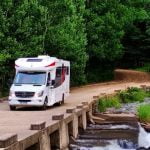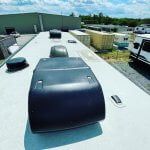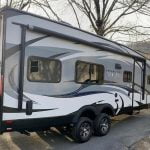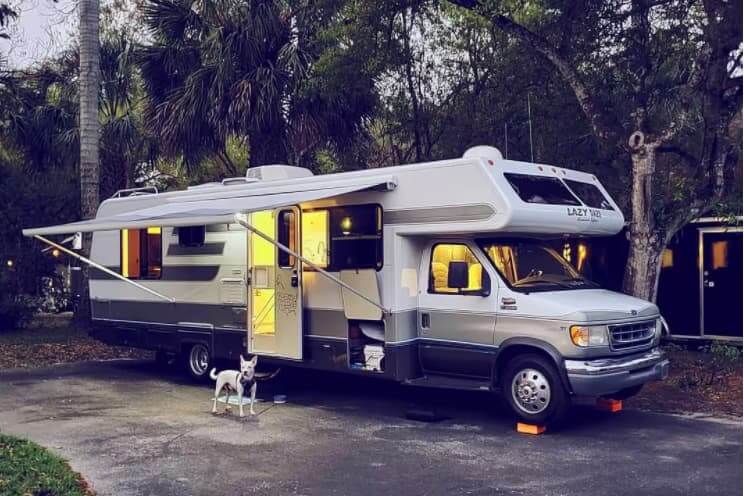
Have you ever considered giving up your home and becoming part of the great RV lifestyle? There are so many advantages to living in an RV full-time, from not having to pay rent or a mortgage to be able to travel the country, but there are also some things you should know before you leave on your RV adventure.
These ten things will help you learn more about full-time RV living and what it takes to live in an RV full-time before jumping yourself.
1-Can you live full-time in an RV?
The answer is yes. But, it’s not for everyone. Some folks are better suited to the RV lifestyle than others.
If you want to live full-time in a motorhome or travel trailer, here are five things you need to know first: before you pull up stakes and hit the road with your rig.
1. Make sure you have what it takes: If living on wheels isn’t right for you don’t do it! RV life isn’t all sunshine and daisies; sometimes, there can be more downsides than upsides to full-time RVing for example, is broken down on the side of some remote highway or stuck in one place because there aren’t any jobs nearby.
2. Have a plan: Even though full-time living is a non-traditional lifestyle choice, that doesn’t mean you should fly by the seat of your pants while traveling from state to state (or country to country).
It’s essential to have a game plan before hitting the road to know where you’re going and how long it will take to get there (i.e., don’t just wing it).
3. Be prepared for extremes. Many RVers are drawn to motorhomes and travel trailers because they give them greater freedom and flexibility when traveling across town or the country. But with great space comes great responsibility, including dealing with extreme weather conditions and potential health issues such as altitude sickness.
4. Plan out each day in advance: The beauty of RV living is to travel anywhere you want, whenever you want. However, they tend to go wrong quickly and without warning when things go wrong. Therefore, it’s crucial to plan out each day (and week) in advance so that you have time to prepare yourself for potentially unforeseen circumstances.
5. Keep an open mind: Lastly, no matter how much research you do beforehand about van life or RV camping, there will always be things about RVing that surprise you along the way. Therefore, if you approach RV living with an open mind and embrace change along the way, then RVing could turn into something special for you.
2-What to Know Before living in an RV?
– You’ll have to store or dispose of the most of your ownerships.
– You have to choose the right RV that meets your needs.
– You’ll probably wish to set up a home base.
– RV Living with animals is challenging.
– You’ll need to get the best insurance coverage.
– A mail-forwarding service is generally required.
– Roadside Aid is Worth it.
– Campsites Variety From Low-cost to Pricey
– You Can Discover Work on the Fly.
3-How much does it cost to live in an RV full-time?
It depends on what type of RV you have and your living needs.
If you love camping and hiking, you can live relatively inexpensively with a tent or small camper van that costs only $500 to $850 monthly.
A toy hauler RV can hold a larger camper with more storage but will cost $4,000.
Class C motorhomes are often considered the middle ground for RV costs; they tend to start at around $3500 and can go up depending on how much luxury you want.
Class A motorhomes tend to be pricier still; they start at around $7500 and go up from there depending on whether you need something spacious enough for a growing family or want something luxurious for weekends away.
But if you’re considering full-time RV living, don’t let sticker shock stop you from exploring your options! There are plenty of ways to save money on RV ownership.
For example, many owners choose not to buy their land and instead park their RVs in RV parks where they pay monthly fees rather than paying for land outright.
4-What RV is best for a full-time living?
There are many different traveling trailers out there that are suitable for full-timers. We have looked into and also found 2 of the absolute best travel trailers for full-time RV living, each with a distinct, habitable layout.
Airstream Classic
The Airstream Standard is Airstream’s flagship traveling trailer. It’s tough to think about a travel trailer much more suited to full-time RV living. The Airstream Classic has all the bells and whistles you could want in a structured tow-behind.
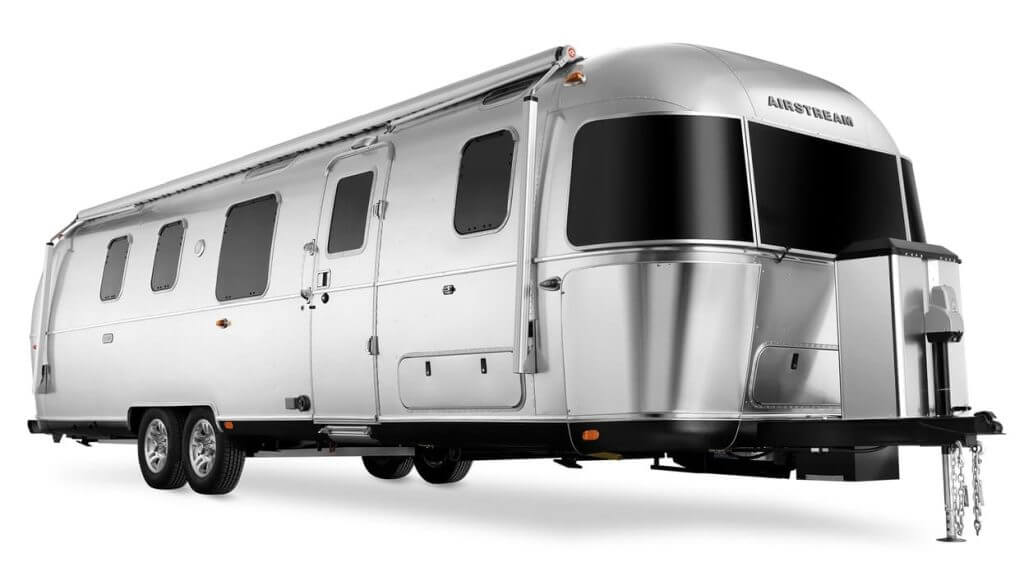
Right here are just several of the elegant attributes that make the Airstream Standard our preferred in the 33-foot travel trailer class:
- Sleeps 4-6
- Smart touch System Controls
- Power jack
- Power awning
- Power beds
- Quiet cooling with heat pump technology
- Costs audio
- 60-inch forecast display TV
- Buzzer
- Rearview screen
- State-of-the-art kitchen with genuine wood personalized cabinets
- Warmed shower flooring
- Retracting the clothesline in the shower
- Lit up exterior door manage and steps
- Heated bathroom towel bar
- 2 40 lb gas containers
- Devoted work station with WiFi and also USB ports
- Outside shower
Northwood Arctic Fox 28′
Northwood develops its travel trailers for year-round usage, even in a position where cool wintertimes are the norm. The Arctic Fox series is improved by an off-road chassis and is wholly insulated throughout to keep you cozy in the winter months and cool in the summer season.
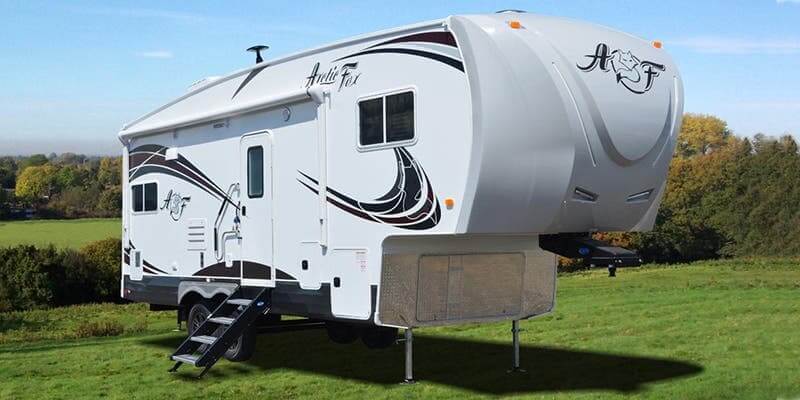
A bent roofing system allows water to escape to maintain moisture out of the trailer. The Arctic Fox also has heated tanks and pipelines to keep the fluids moving, even in ice-cold temperature levels. What makes the Arctic Fox stand apart is the top quality craftsmanship and attributes entering this trailer. Right here are a few of the features:
- Sleeps 2 to 4
- Tons of storage space throughout consisting of a large cupboard
- Entertainment center with an integrated fireplace, concealed electronics billing terminal, TV, stereo, and built-in whiteboards.
- A residential-style stove, 3-burner cooktop, and microwave
- Ten cubic foot fridge and also fridge freezer
- Big restroom with a large shower
- 5 USB billing ports
- Quality timber cabinets
- Back up display
- Ladder and roof storage
- Integrated WiFi Booster
- Bumper sewage system
- Built-in solar panels
- Power jacks
- Three indoor color choices
- 5-point leveling system
5-What states allow you to live in an RV?
While many states can live full-time in an RV legally, complying with conditions is the preferred option.
- Arizona
- Florida
- Washington State
- Texas
- Nevada
- South Dakota
- California
- Wyoming
- South Carolina
In general, states with wide-open spaces such as Eastern Washington, Nevada, and the rest on the above list make it simpler to find a more affordable parcel where you can legally park your RV for extensive durations.
Space typically equates to less limiting zoning and use laws and extra economical land choices.
Likewise, it makes good sense to take into consideration the climate. RV Living means you are much more connected to nature.
Also, selecting a reasonably light environment that you enjoy goes a long way to making the RV lifestyle enjoyable for the long-term, all-year house.
Cozy winter months and the absence of extreme weather conditions make areas of the above states excellent for full-time RV living. And also, they all offer access to unusual sights and even scenic national parks, which could be worth driving your RV up the roadway a bit now and then.
Many of the provided states do not have a revenue tax obligation. However, consider the price of property tax and sales tax obligation when you choose your price-conscious RV parking state.
6-What does Boondocking mean?
To most, boondocking refers to camping off any type of public land, including national parks and state parks.
However, while many RVers are capable of dry camping (camping without hookups), dry campgrounds can be hard to come by and often don’t allow you to stay overnight.
For those interested in a full-time RV lifestyle, boondocking may be more than camping; it may mean living off-grid indefinitely.
Boondockers might live for weeks or months without visiting a traditional RV park or campground.
Boondocking is about finding places where you can stop for free and still enjoy yourself, from scenic rest areas to dispersed campsites that provide seclusion from other travelers but not necessarily water or power hookups.
This guide will help demystify what it means to boondock so that you know whether it’s right for your next trip.
7-How to Prepare for Full-Time RV Living?
Establish a Date
Set a move-in day several months ahead of time. This will undoubtedly give you a factor to start doing away with added things, preparing for your departure, and placing unnecessary items right into storage space. It can be challenging to accumulate the inspiration and get started till you have a particular day in mind.
Develop a Spending plan
Making enough cash is one of the most challenging parts of relocating into an RV full-time unless you have significant savings. It’s needed to create a budget plan ahead of time that takes every one of your costs right into consideration, including camp fees, fuel, maintenance, groceries, RV insurance, and all of the various expenses own full-time RV lifestyle.
Prepare Your RV
Always make sure your gear is ready for life when traveling. Get your RV serviced to ensure it’s a problem before removing it. Pack all the products you will require into it and do away with any products that aren’t strictly necessary.
Remove Extra Things
Vacating your home in an RV will likely leave you with a lot of extra stuff. You can put these things into storage or do away with them.
One of the best suggestions we can use is eliminating as many unnecessary things as feasible.
Hit the trail
Every one planning worldwide won’t be enough unless you go for it. When it comes time to the date you set, you have to remove and check out. Hopefully, you have a health plan to assist and lead you with these first days.
Take Into Consideration a Test Run
As we’ve mentioned several times, staying in an RV is a huge adjustment. We always recommend taking a couple of or three or more test runs before jumping. If you don’t have an RV of your own, you can conveniently rent one using preferred tools like Outdoorsy or take a look at RV Leasings near you right here.
8-What are the pros and cons of living in an RV?
PROS
- THE FLEXIBILITY
- THE EXPERIENCES
- THE WEATHER CONDITION
- NATURE
- THE CHOICE
- TIME WITH EACH OTHER
- MINIMAL LIFESTYLE
- NO DAILY COMMUTE
- FOCUS ON OUR ORGANIZATION
- TIME FOR PERSONAL DEVELOPMENT
CONS
- ABSENCE OF REGIMEN
- FATIGUE
- WI-FI CONNECTION AND ALSO DEPENDABILITY
- UNPREDICTABILITY
- PRICE
- TRAVELING DAYS
- CONNECTION TO FRIENDS AND FAMILY
- DISTANCE TO THINGS (MAIL, GROCERY STORE, WASHING).
- CHANGEABILITY.
- ABSENCE OF NEIGHBORHOOD.
9-what is the average age of full-time RVers?
The ordinary age of the common full-time RVer is coming down, generally due to the number of younger people getting entailed. Just a couple of short years back, most RVers were about 65 to 72 years old. Today, that balanced age has dropped to well listed below sixty.
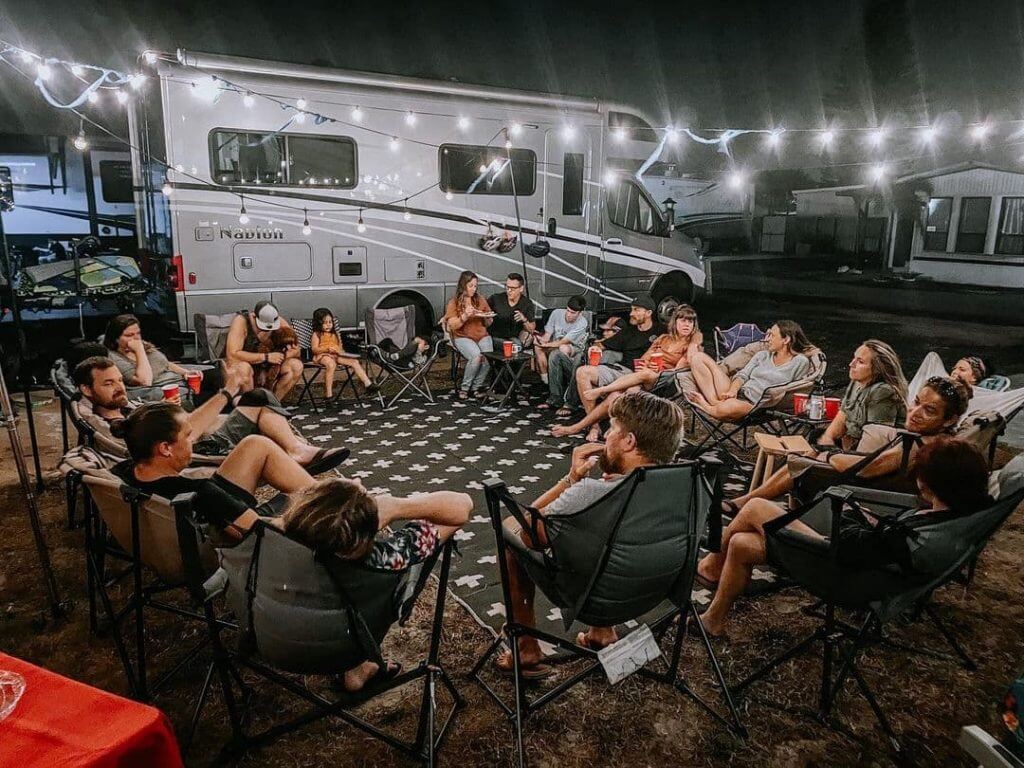
10-Do you have to pay taxes if you live in an RV?
While you don’t pay the same kind of property taxes on an RV that you would certainly pay on the house, if your state costs you a personal property tax, it may be deductible.
The IRS enables you to cross out the price of personal property taxes billed annually and connected to the worth of the asset being taxed.
If you are full-time in your RV, as well as detail your deductions, you can claim your RV as your home; indicating all interest paid throughout the year is insurance deductible.
Even if you live in your RV in some cases, you may have the ability to claim it as a 2nd residence, so be sure to consider this before disregarding the write-off entirely.
There you go!
The ten things you should know before committing to full-time RV living.
There may be a lot to learn in the process; however, as long as you’re ready to jump and go for it, You will never fail.
Make sure you select the people you like and appreciate the journey along the road.

